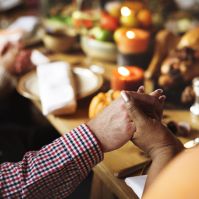 One of the most beloved rituals in the Catholic and Orthodox faiths as the season of Lent approaches is the vespers service on Forgiveness Sunday. It is a time for every member to come before the faith community and ask forgiveness from them. It is also an opportunity to extend forgiveness to others. This service and the subsequent celebrations that may follow help believers enter into the right frame of mind for the Lenten season.
One of the most beloved rituals in the Catholic and Orthodox faiths as the season of Lent approaches is the vespers service on Forgiveness Sunday. It is a time for every member to come before the faith community and ask forgiveness from them. It is also an opportunity to extend forgiveness to others. This service and the subsequent celebrations that may follow help believers enter into the right frame of mind for the Lenten season.
Forgiveness Ritual
During the service, held on the seventh Sunday before Easter, members go to the front of the sanctuary. In some traditions, two lines are formed so that parishioners can face each other, ask and receive forgiveness, and then shift so that they're facing a new person to begin again. In other churches, members simply approach each other individually until everyone is satisfied that they've spoken to all the others. Regardless of how the service is structured, the main goal is for every member to address and give forgiveness to every other person there.
There is typically a liturgical cadence to the exchange. For example, in Eastern Orthodox parishes, one person says, "Forgive me," and the other responds, "God forgives. I forgive." They then bestow a kiss of peace on each other, signifying unity and finishing the encounter before proceeding with the next person. Some communities that practice forgiveness vespers also extend their services to gravesides where forgiveness is asked from the dead.
Popular Celebrations
The vespers service isn't the only way that these traditions observe Forgiveness Sunday, especially among the Greek and Russian Orthodox. During Lent, members observe one of the strictest fasts of the year. For the majority of the six weeks preceding Easter, they abstain from a variety of foods:
- Meat and meat products, including fish
- Dairy
- Eggs
- Oil
- Wine
There are several smaller fasts throughout the year during which Orthodox Christians abstain from certain foods. As these foods are a regular part of the diet of many of the people in these traditions, they often need a way to use excess ingredients so that they don't go to waste.
Forgiveness Sunday is sometimes referred to as Cheesefare Sunday, as it marks the end of the last week these faith communities are allowed dairy until Easter. It often consists of a shared meal to which parishioners bring foods they've made to use up the dairy, oil, and eggs they still have at home. Some who follow Greek traditions often consume a boiled egg as their last food before Lent begins and then end their fast the same way on Easter.
Potential Impacts
What is Forgiveness Sunday supposed to teach those who observe it? The placement of this holy day at the beginning of Lent suggests that it is meant as a preparation for the solemn season ahead. Asking for forgiveness requires admitting out loud that they have erred or caused some offense. It requires a certain amount of humility to do so. Practicing interpersonal forgiveness prepares their hearts to be humble for repentance during Lent.
It can also function as a way to restore relationships. People often hurt each other or cause distress even when they don't mean to. Forgiveness Sunday is an opportunity to face this truth and make peace with everyone in the community. While the actual process of forgiveness may require more time, this ritual can serve as a starting point for healing.
Forgiveness Sunday may only involve a vespers service and a simple meal, but it is an important part of the start of Lent. The ritual helps to prepare parishioners' hearts and minds for the weeks that are to come.



